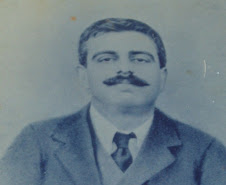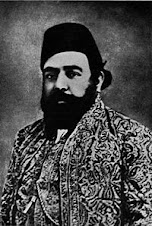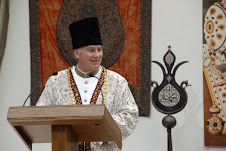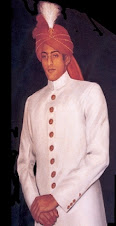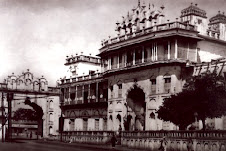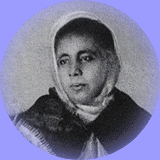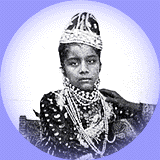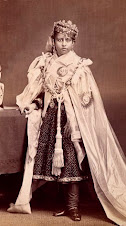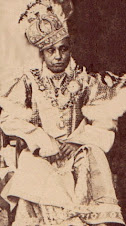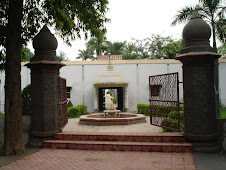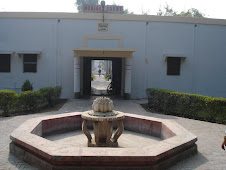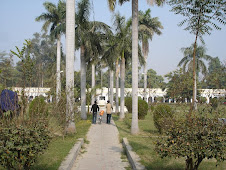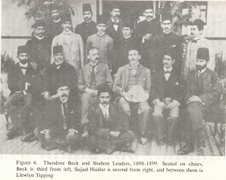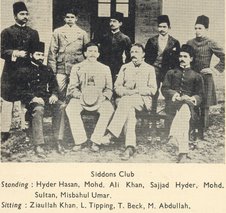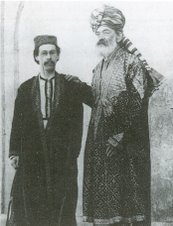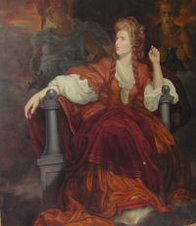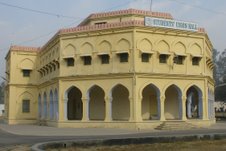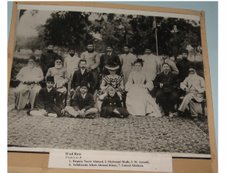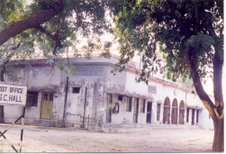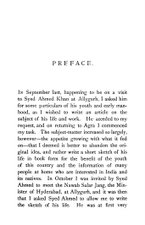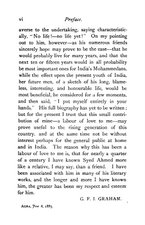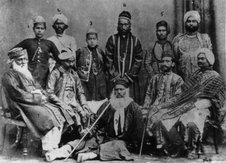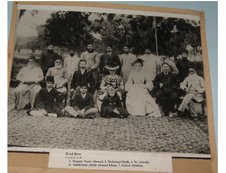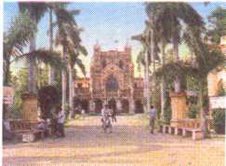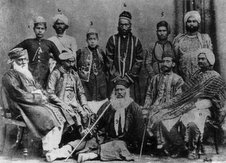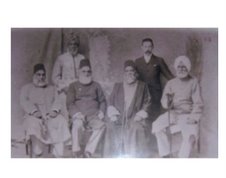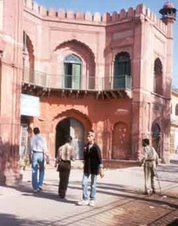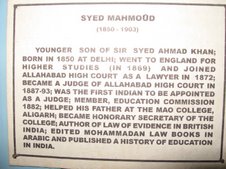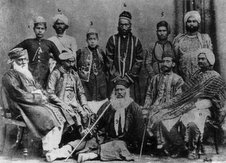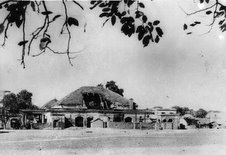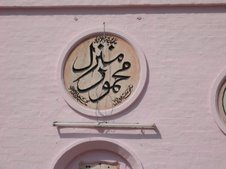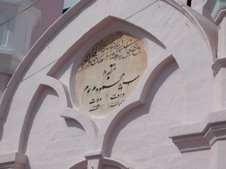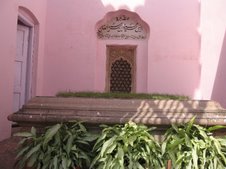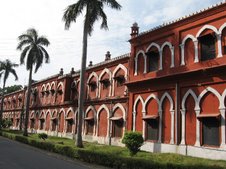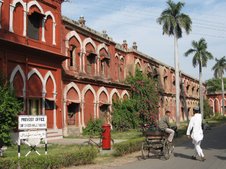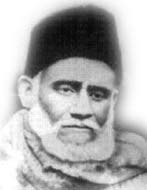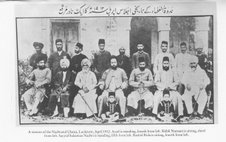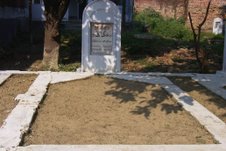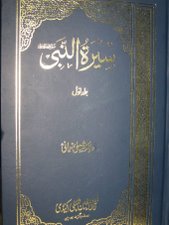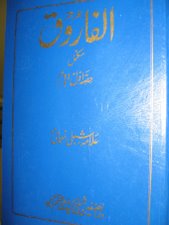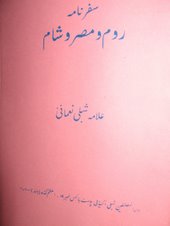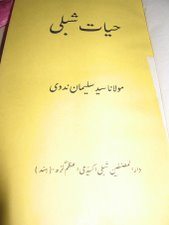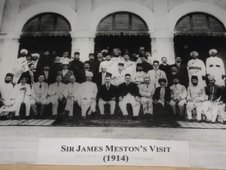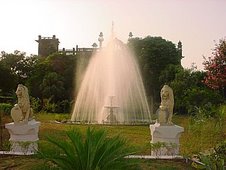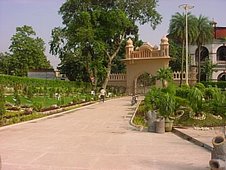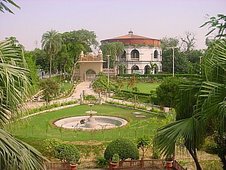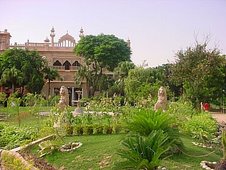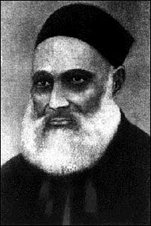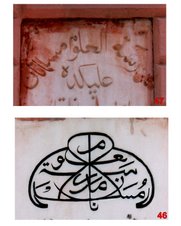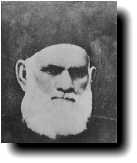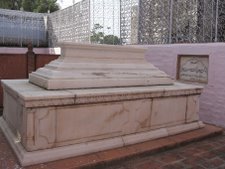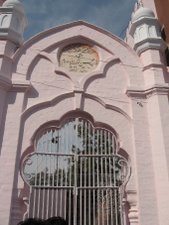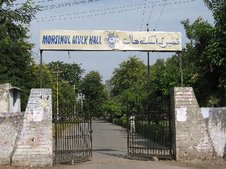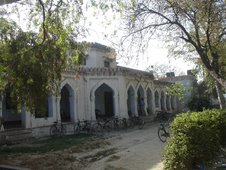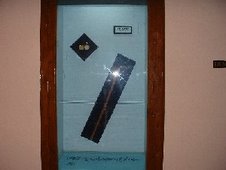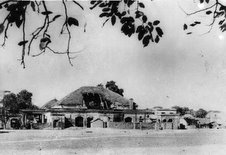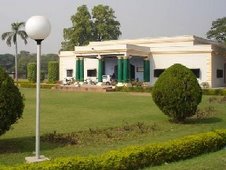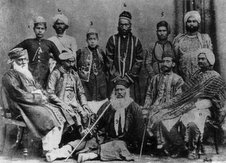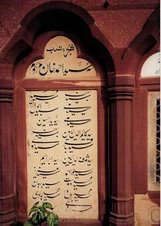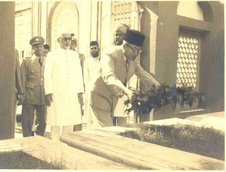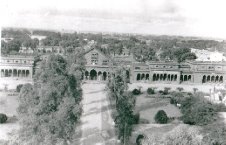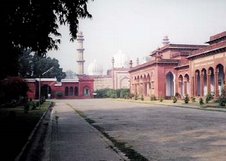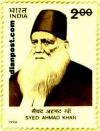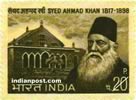Maulana Khawaja Altaf Hussain Hali
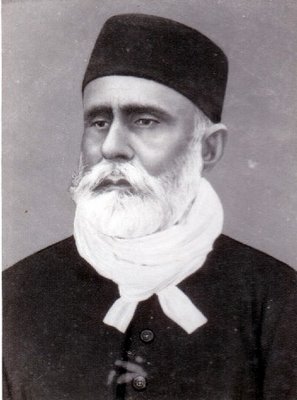
Maulana Khawaja Altaf Hussain Hali
Born: 1837, Panipat (Haryana)
Died: 30th September 1914 in Panipat (Haryana)
Auto-Biography: Hayat-e-Hali
Literary works/Books:
Musaddas e-Madd o-Jazr e-Islam, better known as Musaddas-e-Hali
(An elegaic poem on the Ebb and Tide of Islam)
Hayat-i-Javed, is the biography of Sir Syed Ahmed Khan,
(Now among one of the classics of Urdu language)
Yadgar-e-Ghalib, Mirza Ghalib's life, and a commentator of his poetry
Heyat-e-Saadi, life of great Persian scholar, Shaikh Saadi
Muqaddama-e-Sher-o-Shayari, (A book of literary criticism in Urdu)
Hayaat-e-Hali, Autobiography
Divaan-e-Hali, Collection of Hali’s Poetry
Maulana Khawaja Altaf Hussain Hali (1837-1914) was an Urdu poet, and the last pupil of Mirza Ghalib. He is also one of the most well-regarded biographers of Ghalib's life, and a commentator of his poetry. He also wrote the biography of the Sir Syed Ahmad Khan, founder of Mohammadan Anglo Oriental College (MAO) which later on became Aligarh Muslim University (AMU) in 1920.
To Hali also goes the credit of being the first to introduce the genre of biography in Urdu and all in total he authored three biographies, Heyat-e-Saadi, life of great Persian scholar, Shaikh Saadi, Heyat-e-Javed, life of Sir Syed Ahmad Khan, founder of AMU Aligarh, and his famous Yadgar-e-Ghalib.
Hali also wrote one of the earliest works of literary criticism in Urdu ''"Muqaddamah-i Shi'r-o-Sha'iri".''
Khwaja Altaf Hussain Hali, one of the greatest social reformers of India was born in Panipat in 1837, Altaf Hussain was educated in the same city and later went to Delhi where he wished to gain further education in the Indo-Islamic poetic tradition. It was here he chose the cognomen of "Khastah" (The Spent One, or The Tired One). He was forced to return home, and pursued a government job until displaced by the Mutiny of 1857. After this turning point in his life, he drifted from job to job for several years, arriving eventually in Lahore in the mid 1870s, where he began to compose his epic poem on the request of Sir Syed Ahmad Khan, the Musaddas e-Madd o-Jazr e-Islam (An elegaic poem on the Ebb and Tide of Islam) under the new poetic pseudonym of "Hali" (The Contemporary). The Musaddas, or Musaddas-e-Hali, as it is often known, was published in 1879 to critical acclaim, and considered to herald the modern age of Urdu poetry. On request of Sir Syed Ahmad Khan he wrote the famous Mussadas that was published in 1879. Halis' Mussadas was about the rise and fall of the Muslims. Hali reviled “the rich for their selfishness, the aristocracy for their degeneracy, religious leaders for their bigoted ignorance, poets for their foolish triviality.” Mussadas took Muslim India by storm. Its extracts are still being taught in Muslim schools and recited in religious and educational functions. It created a wide spread awakening amongst the Muslims of India. Apart from his poetic achievements, Hali was a pioneer in Urdu literature. Hali was the first major poet to put forward “the theory that literature should be harnessed into the service of the community, and made to advance the cause of social welfare and betterment.” His poems brought back to life the society of their time far better than any scholarly construction could.
Altaf Hussain Hali, until his death in 1914, served the Aligarh movement with considerable dedication, validating Sir Syed Ahmad's call for change among Muslims. Like Sir Syed Ahmad, Hali found the existing Muslim society to be decadent and static, but he arrived at that view not by comparing it with the modern western civilization, but with the history of Islam. Indeed, by presenting Islam as a modern religion, in accord with science and rationalism.
Hali was for a new start in politics and society as much as in literature. He believed in the irreversible movement of modern civilisation, arguing that only by contact with the West could life and vigour flow back into India. His simple and deeply moving poetry inspired millions and awakened a decadent people to revive their lost glory and look to the future with renewed hope. Hali’s construction of Islam, his understanding of himself as a Muslim, and as an Indian living in British India, are crucial in tracing the historical development of Islam in South Asia. He shared a political heritage and language, which helped reconstruct Muslim identity in the 19th century. Hali came into prominence during one of the darkest hours of Indian Muslim history. The Muslims had taken lead in India's first war of independence against the British in 1857, and after losing the war had to face the brunt of the victor's revenge. Muslim mutineers and their supporters were murdered in the thousands by the British and a policy of systematic discrimination was instituted against the Muslims.
Hali used his pen to bring about social and educational reforms among Muslims. He heralded a new movement in Urdu prose and poetry free from jargon and verbiage. He wrote the famous "Musaddas-e-Hali", a narrative on the rise and fall of Muslims that was published in 1879.
Hali reviled "the rich for their selfishness, the aristocracy for their degeneracy, religious leaders for their bigoted ignorance, and poets for their foolish triviality."
Extracts from Musaddas are still being taught to Indian Muslims in schools and in religious and educational functions. Hali blazed a new trail and used the poetic genre of the long Urdu nazm as an instrument of social and moral reform. Maulana Hali's ghazals reflect his command over the form of poetry but later on in life, he focused more on nazm as a means of expression. Hali also used the nazm for interpreting the beauties of nature, a theme that was more or less neglected, or treated marginally by the poets of classical ghazal.
In his prose treatise, "Muqaddam-e-Shair-o-Shairi", one of the earliest texts in Urdu literary criticism, Hali underscored the limitations of the classical ghazal and pointed out the hollowness of its hackneyed themes, thus putting the nazm on a surer path of progress.
The ghazal has been primarily used as an instrument of aesthetic and intellectual pleasure, and a source of courtly entertainment, while a nazm combines pleasure with purpose, in service of society. It is a more earthbound form of poetry, with a moral and a message. His patriotic nazm like Hubbe Watan went a long way in fostering Hindu-Muslim unity that was being undermined by the British.
In his novel, Majalis-un Nisan (Assemblies of Women), Hali, emphasizes the need of educating women. The heroine, Zubaida Khatun, is taught the Qur'an, Arabic, Persian and Urdu as well as mathematics, geography and history by her father. This was at a time, when studying "British" subjects such as geography and mathematics was a taboo even for Indian Muslim men.
Hali passed away on 30th September 1914 in Panipat, but the movement for reformation and renaissance he helped start continues to this day.
Compiled by:
Afzal Usmani
Born: 1837, Panipat (Haryana)
Died: 30th September 1914 in Panipat (Haryana)
Auto-Biography: Hayat-e-Hali
Literary works/Books:
Musaddas e-Madd o-Jazr e-Islam, better known as Musaddas-e-Hali
(An elegaic poem on the Ebb and Tide of Islam)
Hayat-i-Javed, is the biography of Sir Syed Ahmed Khan,
(Now among one of the classics of Urdu language)
Yadgar-e-Ghalib, Mirza Ghalib's life, and a commentator of his poetry
Heyat-e-Saadi, life of great Persian scholar, Shaikh Saadi
Muqaddama-e-Sher-o-Shayari, (A book of literary criticism in Urdu)
Hayaat-e-Hali, Autobiography
Divaan-e-Hali, Collection of Hali’s Poetry
Maulana Khawaja Altaf Hussain Hali (1837-1914) was an Urdu poet, and the last pupil of Mirza Ghalib. He is also one of the most well-regarded biographers of Ghalib's life, and a commentator of his poetry. He also wrote the biography of the Sir Syed Ahmad Khan, founder of Mohammadan Anglo Oriental College (MAO) which later on became Aligarh Muslim University (AMU) in 1920.
To Hali also goes the credit of being the first to introduce the genre of biography in Urdu and all in total he authored three biographies, Heyat-e-Saadi, life of great Persian scholar, Shaikh Saadi, Heyat-e-Javed, life of Sir Syed Ahmad Khan, founder of AMU Aligarh, and his famous Yadgar-e-Ghalib.
Hali also wrote one of the earliest works of literary criticism in Urdu ''"Muqaddamah-i Shi'r-o-Sha'iri".''
Khwaja Altaf Hussain Hali, one of the greatest social reformers of India was born in Panipat in 1837, Altaf Hussain was educated in the same city and later went to Delhi where he wished to gain further education in the Indo-Islamic poetic tradition. It was here he chose the cognomen of "Khastah" (The Spent One, or The Tired One). He was forced to return home, and pursued a government job until displaced by the Mutiny of 1857. After this turning point in his life, he drifted from job to job for several years, arriving eventually in Lahore in the mid 1870s, where he began to compose his epic poem on the request of Sir Syed Ahmad Khan, the Musaddas e-Madd o-Jazr e-Islam (An elegaic poem on the Ebb and Tide of Islam) under the new poetic pseudonym of "Hali" (The Contemporary). The Musaddas, or Musaddas-e-Hali, as it is often known, was published in 1879 to critical acclaim, and considered to herald the modern age of Urdu poetry. On request of Sir Syed Ahmad Khan he wrote the famous Mussadas that was published in 1879. Halis' Mussadas was about the rise and fall of the Muslims. Hali reviled “the rich for their selfishness, the aristocracy for their degeneracy, religious leaders for their bigoted ignorance, poets for their foolish triviality.” Mussadas took Muslim India by storm. Its extracts are still being taught in Muslim schools and recited in religious and educational functions. It created a wide spread awakening amongst the Muslims of India. Apart from his poetic achievements, Hali was a pioneer in Urdu literature. Hali was the first major poet to put forward “the theory that literature should be harnessed into the service of the community, and made to advance the cause of social welfare and betterment.” His poems brought back to life the society of their time far better than any scholarly construction could.
Altaf Hussain Hali, until his death in 1914, served the Aligarh movement with considerable dedication, validating Sir Syed Ahmad's call for change among Muslims. Like Sir Syed Ahmad, Hali found the existing Muslim society to be decadent and static, but he arrived at that view not by comparing it with the modern western civilization, but with the history of Islam. Indeed, by presenting Islam as a modern religion, in accord with science and rationalism.
Hali was for a new start in politics and society as much as in literature. He believed in the irreversible movement of modern civilisation, arguing that only by contact with the West could life and vigour flow back into India. His simple and deeply moving poetry inspired millions and awakened a decadent people to revive their lost glory and look to the future with renewed hope. Hali’s construction of Islam, his understanding of himself as a Muslim, and as an Indian living in British India, are crucial in tracing the historical development of Islam in South Asia. He shared a political heritage and language, which helped reconstruct Muslim identity in the 19th century. Hali came into prominence during one of the darkest hours of Indian Muslim history. The Muslims had taken lead in India's first war of independence against the British in 1857, and after losing the war had to face the brunt of the victor's revenge. Muslim mutineers and their supporters were murdered in the thousands by the British and a policy of systematic discrimination was instituted against the Muslims.
Hali used his pen to bring about social and educational reforms among Muslims. He heralded a new movement in Urdu prose and poetry free from jargon and verbiage. He wrote the famous "Musaddas-e-Hali", a narrative on the rise and fall of Muslims that was published in 1879.
Hali reviled "the rich for their selfishness, the aristocracy for their degeneracy, religious leaders for their bigoted ignorance, and poets for their foolish triviality."
Extracts from Musaddas are still being taught to Indian Muslims in schools and in religious and educational functions. Hali blazed a new trail and used the poetic genre of the long Urdu nazm as an instrument of social and moral reform. Maulana Hali's ghazals reflect his command over the form of poetry but later on in life, he focused more on nazm as a means of expression. Hali also used the nazm for interpreting the beauties of nature, a theme that was more or less neglected, or treated marginally by the poets of classical ghazal.
In his prose treatise, "Muqaddam-e-Shair-o-Shairi", one of the earliest texts in Urdu literary criticism, Hali underscored the limitations of the classical ghazal and pointed out the hollowness of its hackneyed themes, thus putting the nazm on a surer path of progress.
The ghazal has been primarily used as an instrument of aesthetic and intellectual pleasure, and a source of courtly entertainment, while a nazm combines pleasure with purpose, in service of society. It is a more earthbound form of poetry, with a moral and a message. His patriotic nazm like Hubbe Watan went a long way in fostering Hindu-Muslim unity that was being undermined by the British.
In his novel, Majalis-un Nisan (Assemblies of Women), Hali, emphasizes the need of educating women. The heroine, Zubaida Khatun, is taught the Qur'an, Arabic, Persian and Urdu as well as mathematics, geography and history by her father. This was at a time, when studying "British" subjects such as geography and mathematics was a taboo even for Indian Muslim men.
Hali passed away on 30th September 1914 in Panipat, but the movement for reformation and renaissance he helped start continues to this day.
Compiled by:
Afzal Usmani



